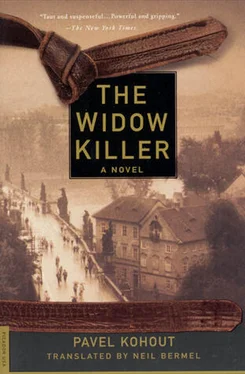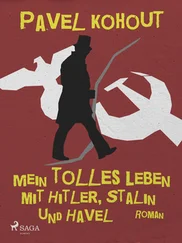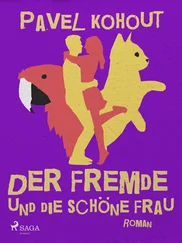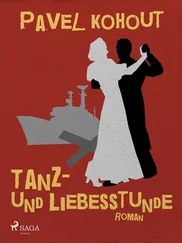“Report,” the pock-marked man requested in a half-whisper.
Despite this all the subcommanders heard him and rushed over to announce crisply that they were already finished. Except for one.
“I’m not done yet, major. They managed to lock themselves in the air-raid shelter. The building used to be a bank; it has steel doors.”
“Are all of them down there?”
“One didn’t make it.”
“Bring him here.”
They instantly hauled a middle-aged man forward; although it was afternoon, he was dressed in a bathrobe and slippers. Asked how many people were down below, he counted nervously in passable German until he arrived at six men, ten women, and eight children.
“Is your family there too?”
“Yes, a boy and a girl… my wife and mother-in-law…”
“Draw me the shelter!”
Shakily he drew a simple rectangle and a staircase with several turns on the back of some sort of receipt the officer found in his breast pocket.
“Where does the air come from?”
“There’s a vent from the ground floor…” He drew it. “The garbage cans cover it.”
“Will they hear you if you call down to them?”
“Probably.”
“So do it!”
“What should I…”
“That I’ll give them precisely three minutes to open up, otherwise I’ll have you shot.”
A hot flush appeared on the Czech’s face, reminding Morava of the Klásterec priest, but the man gathered enough courage to ask a further question.
“And what will you do with them… with all of us then?”
With a gesture of his head he took in the whole street, full of exiles.
“Your people down in Nusle have blocked our way through the city. You’ll walk in front of my soldiers as a human shield.”
“But I can’t tell… I can’t just ask them…”
The scarface pulled a large pistol out of its holster.
“Go!”
My God, how can You let… Morava cut himself short: after all, that’s exactly why he’d given up on Him last week. His heart ached for the unfortunate man, who had no choice. And it always works, every time; despite the faith, love, morality, and honor we acquire so painfully in our lifelong struggle for self-betterment, in moments of crisis what triumphs is a blind instinct for self-preservation. In that respect we humans are worse than animals, who defend their pack until torn to bits.
The man’s gaze wandered to the Czech police uniforms. At that moment, Morava’s stiff arms behind his neck stopped hurting him; he was glad that even in this garb he was treated no differently from the other hostages. However, the man suddenly smiled sadly right at him.
“If you survive, tell them that I loved them.”
“In German!” boomed the major.
“You have no right!” the man retorted in that language. “We’re civilians. You’ll be punish…”
A shot ended the sentence.
The scarface stuffed his gun back and handed the sketch to his unsuccessful subordinate.
“Somewhere here is the opening. Throw a couple of sticks of dynamite in, and if they don’t open up, a few grenades. Everyone else, on the double!”
With shouts and shoves, small groups of men, women, pensioners, and children were put together and the cordon of soldiers tried to goad them onward, but soon it was clear that many could not keep up the pace. At the nearest square the Germans weeded out the old and the very young. Morava helplessly watched parents’ heartrending attempts to protect their children; some took them in their arms or on their shoulders, while others shooed them beyond the line of guards, calling out the addresses of relatives or friends.
The new groups trotted a few hundred yards further to the court building. At the crown of the street, which sank down into the Nusle valley in a long curve, tractors were shoving the last incinerated tram wagon from the German-captured barricade over to the edge of the carriageway; it was a rear car, and the pock-marked SS officer climbed up on its middle platform with the bareheaded civilian.
“An interpreter!”
The Czechs’ experiences so far quashed any impulse they may have had to step out of the crowd that had become their last refuge.
On the second call, Morava volunteered. The officer indicated he was to join them on the tram, and nodded to his guide.
“Your fellow citizens have lost all reason,” the skull roared at the throng. “They have blocked the path of hundreds of thousands of German soldiers who are defending Europe against Bolshevism. Since they did not let us pass, you will have to convince them; it is our right and your responsibility! Translate!”
Morava deliberately translated in the third person, making it clear he was not one of them.
“Anyone who insists you are civilians is lying. A handful of bandits have made all of you rebels, meaning you are not subject to protection. If we bleed needlessly, then so will the Czechs. Once your people cease their resistance, we will once again treat you as ordinary citizens under international law. That is all. Translate!”
When he had finished, he asked the commander, “May I add something?”
“No!”
“It would be in your interest for these people not to panic. I wanted to tell them an assault might not be necessary, because Colonel Meckerle is negotiating with the Czech National Council.”
Both Germans were visibly shocked, each in his own way.
“How do you know that?” the SS man asked.
“How do you know him?” the civilian inquired.
“I told your men when we were detained that we are both“—he pointed to Litera—“members of the local criminal police working in close cooperation with your officers. This morning I was present at a meeting between my superior and a Gestapo representative; they’re looking for a way to prevent further fighting. It’s not in your interest to cause more pointless losses of life!”
They conducted the conversation on the tramcar platform, tensely followed by hundreds of Czech and German eyes. The major was evidently wavering.
“I’m also a confidante of Lieutenant General Meckerle,” the civilian said, emphasizing the title. “Who was this envoy?”
“Chief Inspector Buback,” Morava said and immediately realized he had made an error.
“Didn’t I tell you?” The shaven head crowed triumphantly. “The Lieutenant General would never have entrusted a traitor — a deserter! — with such a task. Buback’s authority has automatically devolved to me, and therefore my orders are still valid: clear a route!”
If Morava had briefly thought he could convince the SS man, the German’s eyes soon disabused him of the notion. They clearly had only one goal: to get as far as possible from the scene of their crimes. The man turned to his officers.
“Get moving.”
In a few moments the attacking tanks’ motors roared to life. The hundred-strong Czech crowd was shoved into the wide, sloping street. One last gesture of false nobility awaited the policemen.
“I’ll treat you as negotiators,” the major announced. “You’ll be returned to where you were detained.”
Morava saw in his mind that ordinary man who had sacrificed himself for his family. Futile or not, his deed was a challenge. He glanced at Litera and saw agreement in his eyes.
“We’ll go with them,” he said. “Maybe a solution will be found… so long as you don’t order them to fire prematurely.”
“It all depends on your side,” the officer retorted, and motioned genteelly to them to climb down first from the tram platform, as if he were waving them through a cafe door.
The tanks rode close behind them. Morava and Litera had to run again to catch up to the Czechs, who were now spread across the width of the street. Behind them were SS men with guns at their sides. The soldiers and Czechs were surprised to see two police uniforms pushing their way through them to get up front. The two of them did not speak the whole way down; talking was beside the point.
Читать дальше












